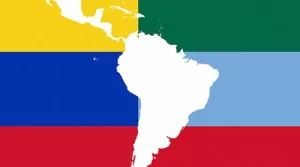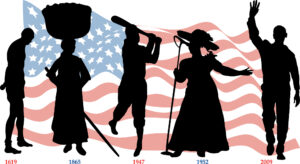|
Getting your Trinity Audio player ready...
|
Reading Time 4 mins
 Lately, I’ve contemplated national mottos, those of North and South America and the Caribbean. I thought that forging a collective identity was a significant component of nation-building in these parts.
Lately, I’ve contemplated national mottos, those of North and South America and the Caribbean. I thought that forging a collective identity was a significant component of nation-building in these parts.
To my mind, all of these countries in the New World were populated by some combination of indigenous natives and immigrants from Africa, Europe, Asia, the Middle East, and just about anywhere else. They were smashed together by European colonialism and its genocide, slavery, racial oppression, and immigration. As such, I expected all, or most, would have had a motto addressing the central identity problem we all faced, which involved building societies out of the disparate groups whose encounter was so unpleasant, bordering on traumatic.
Indeed, the yearning is there in the two I knew: T&T’s Together we aspire, together we achieve, which my cynically irreverent people sometimes rephrase as “Together we perspire, together we conceive,” and Jamaica’s “Out of many, One people.”
It turns out I was quite wrong. Some national mottos emphasize unity—11 if you count Antigua and Barbuda’s borderline. Each endeavor, all achieves. However, in a few cases, the remaining 31 motivate citizens towards quite different or even no goals.
For instance, Belize’s Sub umbra floret (Latin for Under the shade I flourish) suggests an unpleasant climate. Also solar but very different is Saint Lucia’s The land, the people, the light or perhaps Montserrat’s more earthy A people of excellence, molded by nature, nurtured by God.
Guatemala’s Libre Crezca Fecundo (Spanish for Grow Free and Fertile) celebrates a densely forested land or exhorts citizens to step up their procreative activities.
The British Virgin Islands’ Vigilate (Latin for Be watchful) encourages paranoia. In contrast, Chile’s Por la razón o la fuerza (Spanish for Through Reason Or By Force) is downright intimidating, only slightly more creepy than Colombia’s Libertad y orden (Spanish for Freedom and order) and Dominica’s sepulchral Après Bondié, C’est la Ter, which is Creole for After God, the Earth.
Panama, torn off Colombia by the US, who wanted to control the new state’s eponymous Canal, was given an appropriately cynical Pro mundi beneficio (Latin for the world’s benefit). In contrast, Puerto Rico wins the prize for sheer obscurity. That US colony’s motto is Joannes est nomen ejus (Latin for John is his name), taken from the Latin bible Luke 1:63. It refers to the fact that although the island is named after its port (Puerto Rico = Rich Port), the port, San Juan, was once the island’s name, after Saint John the Baptist.
On the other hand, Bermuda’s Quo fata ferunt (Latin for Whither the fates carry us) might as well have been Que sera sera or even Whatever.
Of course, those are the outliers. There are also references to justice and order, but the most common appeals are to liberty and, by far, to God. Eight countries, including the purportedly secular USA, reference the Almighty more than any other theme.
The USA’s unofficial motto was originall y E Pluribus Unum (Latin: Out of many, one), which was included on the Great Seal by Act of Congress in 1782. However, it did not mean the same as Jamaica’s similarly-worded Out of Many, One People. Even today, many in the US do not consider all citizens to be one people, far less than in the 18th century. Instead, “Many” in the old US motto referred to the original 13 colonies that banded together as one republic in rejecting the British. Then in July 1956, in response to Soviet atheism, the US Congress declared the national motto: In God We Trust.
y E Pluribus Unum (Latin: Out of many, one), which was included on the Great Seal by Act of Congress in 1782. However, it did not mean the same as Jamaica’s similarly-worded Out of Many, One People. Even today, many in the US do not consider all citizens to be one people, far less than in the 18th century. Instead, “Many” in the old US motto referred to the original 13 colonies that banded together as one republic in rejecting the British. Then in July 1956, in response to Soviet atheism, the US Congress declared the national motto: In God We Trust.
On first consideration, I thought that the US would have been better served by a Jamaica-type motto, even if it were just an ideal to which one could aspire. After all, the source of most of the USA’s swept-under-the-carpet problems has always been rooted in the deep-seated belief that African-Americans, Native Americans, and non-European immigrants are not full members of the society.
The truth is, it doesn’t matter when it comes to the US. Other countries’ mottos say something about them or their ideals, such as the Bajan Pride and Industry, even if it’s something trivial, such as Canada’s A mari usque ad mare (Latin: From sea to sea) or obscure like Saint Helena’s Loyal and unshakeable. But the US, where flag-pledging and anthem-singing are more prevalent than anywhere else, is also given to self-delusion bordering on psychosis. What George Orwell referred to as “doublethink”. It is a country whose 1776 independence declaration claims that “We hold these truths to be self-evident, that all men are created equal, that their Creator endows them with certain unalienable Rights, that among these are Life, Liberty and the pursuit of Happiness,” while simultaneously enslaving black people and practicing genocide against Native Americans.
It was the last NATO country to establish formal democracy, having legally implemented racial apartheid up to 1964 (and felt it necessary to continue it by other means ever since). It is a country that has installed dictatorships in other client states worldwide, legalized torture, murder, and indefinite detention without giving reasons, and since 2001, proposes that peace can only be built on permanent war. Yet it considers itself to be the democratic land of the free (with the world’s highest proportion of incarcerated citizens). Maybe their motto should be taken from the Party’s three slogans in Orwell’s 1984:
War is Peace, Freedom is Slavery, and Ignorance is Strength.



A very good run down on the Caribbean.
I am reminded of Kwame Nkrumah
Neo-Colonialism—In Neo-Colonialism: the Last Stage of Imperialism Kwame Nkrumah explains:
“Neo-colonialism is based upon the principle of breaking up former large united colonial territories into a number of small non-viable States which are incapable of independent development and must rely upon the former imperial power for defense and even internal security.
Their economic and financial systems are linked, as in colonial days, with those of the former colonial ruler.”
Night-Visions: Illuminating War and Class on the Neo-Colonial Terrain explains:
“The previous capitalist world order was bipolar, with everyone visible massed around opposing poles of oppressor vs. oppressed. It was colonized vs. colonizer, white vs. black, invader vs. indigenous.
The growing chaos of the neo-colonial world order is that many different peoples—armed with conflicting capitalist agendas—have been loosed to fight it out… Trans-national capitalism is driving a certain kind of breakthrough idea, a “multicultural” worldview in which each people and grouping is freed and encouraged to explore its own capitalist agenda no matter what form it takes…Everyone is free to go for it, free to fight it out any way they want so long as they don’t endanger the system itself.”
In the context of this series, neocolonialism describes the shape-shifting nature of contemporary imperialism that absorbs and capitalizes on the emergence of new politics and identities. Subgroups are assimilated into kapitalism and bonded to imperialist interests, all for the purpose of maintaining material colonial domination.”
We are now in a new phase of capitalism, financial capitalism and repressive accumulation, which of course makes the old phase of imperialism somewhat obsolete.
This new imperialism is more vicious, more cosmetic but in the 1950’s while Keynes was putting forth the idea of Bancor so that colonies after WWII could stand on their own and have an international banking system that was not weaponized, they struck overthrowing governments in Iran, Jamaica and swaths of Latin America.
It was not to be.
What we saw instead is the brutality of colonialism and neo-colonialism as the US toppled government after government in both the Caribbean and South America and elsewhere.
De-dollarization is what the US fears and thus the BRICS and the movement to CELAC and a new ALBA.
But make no bones about it, the US has assets and agents in all countries mentioned.
A new system of economics is needed.
Capitalism is killing all of us.
The spirit of solidarity will be experienced in the movement for social justice and class justice.
For it always has been.
We have all been colonized by ‘capital’.
Thought-provoking analysis reminding us that national icons and mottos and other such constructs reflecting national ideals are projects. The implication also is that we can create better ideals than the ones handed down.
Johnson presents a timely critique of the contradictions and paradoxes present in our national mottos and coats. The author’s critique of the US motto, “In God We Trust,” and its failure to acknowledge the country’s troubled history with equality and inclusivity, resonates deeply. KJ’s proposition of Jamaica’s “Out of Many, One People” as possibly a more aspirational and inclusive ideal for the US needs deeper appreciation, especially in light of the attacks on black education in the United States. This sentiment echoes the need for a more honest and self-reflective approach to nation-building.
This is an invaluable contribution to the continuing conversation across the region, especially most recently in T&T, regarding national image-making and decolonializing our mind space.